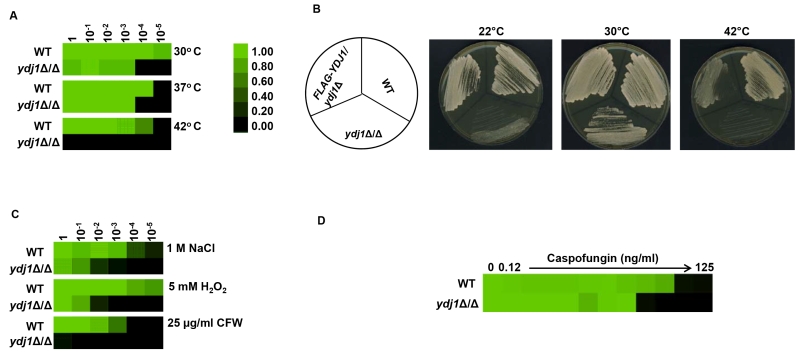Back to article: Ydj1 governs fungal morphogenesis and stress response, and facilitates mitochondrial protein import via Mas1 and Mas2
FIGURE 1: Ydj1 is required for stress resistance. (A) Ydj1 is required for thermal adaptation. Temperature sensitivity was assayed by monitoring the growth of C. albicans wild-type (WT) and ydj1Δ/ydj1Δ mutant cells at 30°C, 37°C, and 42°C. Cells were diluted 10-fold in YPD medium and grown statically at the indicated temperatures for 72 hours. Growth, measured by absorbance at 600 nm, was averaged for duplicate measurements and normalised relative to the undiluted wild-type strain (see colour bar). (B) Fitness and temperature sensitivity of the wild-type strain, the ydj1Δ/ydj1Δ mutant, and the FLAG-YDJ1/ydj1Δ complemented strain. Strains were streaked onto YPD plates as diagrammed, and incubated at either 22°C, 30°C or 42°C for 48 hours. (C) Ydj1 is important for stress adaptation. Wild-type (WT) and ydj1Δ/ydj1Δ mu-tant cells were diluted 10-fold in YPD medium supplemented with 1 M NaCl, 5 mM H2O2, or 25 µg/ml calcofluor white (CFW), and incubated statically at 30°C for 48 hours. Growth, measured by absorbance at 600 nm, was averaged for duplicate measurements and normalised relative to the undiluted WT strain. (D) Ydj1 potentiates caspofungin tolerance. MICs were performed in YPD medium with a caspofungin gradient from 0 to 125 ng/ml, in two-fold dilutions at 30°C. Growth, measured by absorbance at 600 nm, was averaged for duplicate measurements and normalised relative to the undiluted WT strain.

